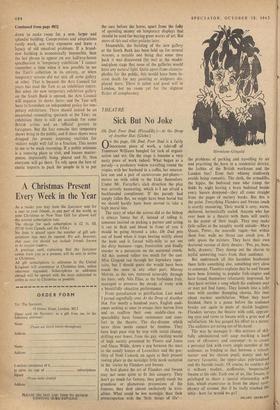THEATRE
Sick But No Joke
Oh Dad, Poor Dad. (Piccadilly.)—Az the Drop of Another Hat. (Globe.)
(NN the page, Oh Dad, Poor Dad is a fairly %h./innocuous piece of work, a take-off of Tennessee Williams bungled for lack of organi- sation and wit. On the stage it became a very nasty piece of work indeed. What began as a parody—a predatory widow travelling round the tropics with her husband in a coffin, her emascu- late son and a pair of carnivorous pot-plants-- moves on with relish to the kicks themselves. Under Mr. Forsythe's slick direction the play was actively nauseating, which is I am afraid a backhanded compliment. If the parody had simply fallen flat, we might have been bored but we should hardly have been moved to take a high moral line.
The story of what the actress did to the bishop is always funny but if, instead of telling it, someone insisted on picking a partner and acting it out in flesh and blood in front of you it would be going beyond a joke. Oh Dad gets out of hand when it stops beating wittily about the bush and is forced willy-nilly to act out the dirty business—rape, frustration and finally murder in a paroxysm on the maternal couch. All this seemed rather too much for the cast. Miss Gingold ran through her legendary reper- toire, but I should guess she would have been much the same in any other part; Murray' Melvin, as the son, stuttered miserably through his lines; only Alix Elias, as the forbidden fruit, managed to preserve the shreds of irony with a beautifully objective performance.
From putrefaction to petrifaction. Last week I passed regretfully over At the Drop of Another Hat. For nearly a hundred years, English audi- ences seeking at once to escape their barren lives and to reaffirm their own middle-class re- spectability have found sustenance and com- fort in the theatre. The day-dreams which serve these needs cannot be timeless. They have kept pace step by step with social change, drifting ever lower, from the gay, exciting world of high society presented by Pinero and Jones and Oscar Wilde, down a peg between the wars to the comfy homes of Loamshire and the gen- tility of Noel Coward, on again to their present resting place in the nostalgic little nook occupied in the 'sixties by Flanders and Swarm.
At first glance the art of Flanders and Swann may not seem quite to fit this category. They don't go much for fantasy, they gently mock the grandiose or glamorous pretensions of the foneses, they deal almost exclusively in trivi- alities. What could be less nostalgic than their preoccupation with the 'little things of life'— Hertnione Gingold the problems of parking and travelling by air and practising the horn in a residential district, the foibles of the British workman and the London bus? Even their whimsy studiously avoids being romantic. The sloth, the armadillo, the hippo, the bedstead men who tramp the fields by night leaving a brass bedstead beside every Sussex dewpond—they all come straight from the pages of nursery books. But this is the point. Everything Flanders and Swann touch is overtly reassuring. Their world is cosy, warm, sheltered, hermetically sealed. Anyone who has ever been in a theatre with them will testify to the power of their magic. They may make little sallies at the naughty world outside—Mary Quant, Pinter, the nouvelle vague—but within these four walls no threat can touch you. It only spices the mixture. They have their own doctored version of dirty theatre: `Pee, po, bum, belly, drawers.' They thump out the chorus to joyful answering roars from their audience.
But underneath all this harmless bonhomie there lurks something else, something very close to contempt. Flanders explains that he and Swann have been listening to popular folk-singers and have found, themselves reluctantly impressed. So they have written a song which the audience may or may not find funny. They launch into a jolly tune with another thumping chorus, this time about nuclear annihilation. When they have finished, there is a pause before the audience breaks out again in peals of slavish laughter. Flanders surveys the theatre with cold, apprais- ing eyes and turns to Swann with a grim nod of satisfaction. He has gauged his effect to a nicety. The audience are eating out of his hand.
The way he manages it—this mixture of skil- fully administered soft soap masking a hard core of effrontery and contempt---is to create a personal link with every single member of the audience, as binding as that between a school- master and his chosen pupil, nann,y and her
nursery favourite, the upper-class pub-landlord and the barside toady. Of course, he couldn't do it without modest, inoffensive, bespectacled
Swann at his side. Eaoh one of us, like Swann, is privileged to share a special relationship with him, which exonerates us from the abject syco- phancy all around. But if he really cracked the whip--how far would we go? HILARY• SPURLING






































 Previous page
Previous page